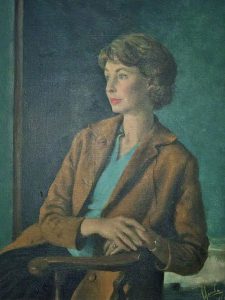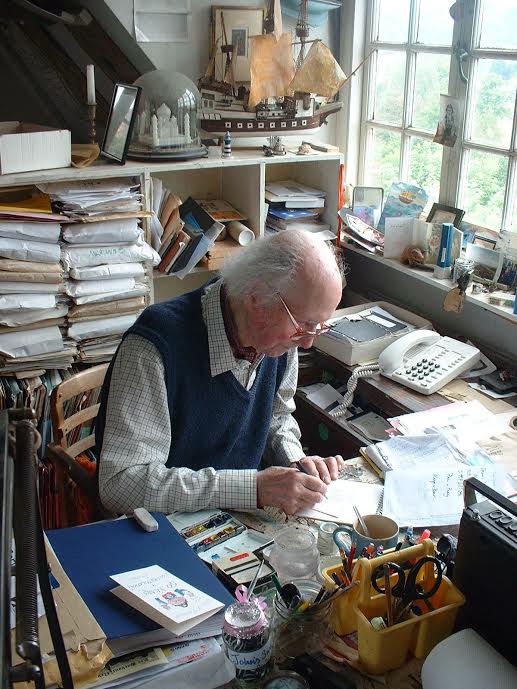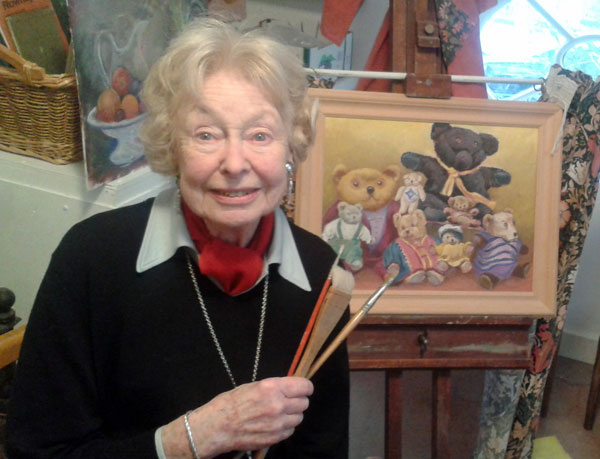“Why would anyone want to interview me?” That was Priscilla Ryan’s surprising response when I asked if I could write about her for our Ryers Unwrapped series. A vibrant, positive and public spirited person, Priscilla is always up for any worthy project in need of support and seems delightfully unaware how much her contribution in Rye is valued.
Whether it is supporting a fund raising event, opening a new project, acting as a volunteer, putting on a party to welcome a neighbour or to celebrate a friend’s birthday, Priscilla will be there radiating her vitality and warmth.

Not only is Priscilla a talented artist, but a keen supporter of many voluntary organisations. She has been a volunteer at the Rye Art Gallery, Rye Museum, Lamb House, a Friend of Playden Church (where her husband and brother are buried), a Patron of the Rye Arts Festival, Friend of Fletcher in Rye, Vice President of the Tuesday Painters and President of the Rye Harbour branch of the RNLI.
“I’ve always enjoyed working with different groups. I love Rye and I’ve been very lucky but it’s high time to get out of the way and hand over to other people now, although sadly not everyone wants to take on the challenge.” She refers to the difficulty that many organisations have to recruit volunteers to replace those needing to step down.
Priscilla is the granddaughter of the celebrated architect Sir Reginald Blomfield RA, who is perhaps best known for designing the Menin Gate war memorial in Ypres, Flanders, and the Cross of Sacrifice designed for the Imperial War Graves Commission to commemorate soldiers who lost their lives during the Great War (you can see a splendid example outside St Mary’s Church). In 1886, Sir Reginald married the daughter of Henry Burra of Rye and went on to design Saltcote Place and many of the houses on the Playden Ridge, including his own house.
When Priscilla and her younger daughter Isabel greeted me at her house, I was aware of walking into a fascinating visual history of a full and interesting life. The rooms and hallways are adorned with paintings, portraits, photos, diaries and books. Alongside her late husband John Ryan’s humorous drawings of his Captain Pugwash character, there are his bleak paintings portraying his horrific four years in Burma during the war, as well as Priscilla’s own paintings – oils, watercolours and pen and ink drawings.
 Creativity runs through the whole family and began early in Priscilla’s life. Coming from a strong line of artists she says that her memories are always visual. “There were frequent visits to my grandparents (whose house can be seen from her garden) where I remember my grandmother anchoring her hat with a huge hatpin, putting on her boots and walking across the fields for a day’s painting of the Romney Marsh landscape.” After the war, Priscilla would go on sketching trips to France with her father, “a marvellous man”.
Creativity runs through the whole family and began early in Priscilla’s life. Coming from a strong line of artists she says that her memories are always visual. “There were frequent visits to my grandparents (whose house can be seen from her garden) where I remember my grandmother anchoring her hat with a huge hatpin, putting on her boots and walking across the fields for a day’s painting of the Romney Marsh landscape.” After the war, Priscilla would go on sketching trips to France with her father, “a marvellous man”.
Her favourite mediums are pen and ink and watercolour – landscapes, houses and gardens. Priscilla loves to let her sense of humour show in her work and you can often find a frog or a cat in the corner of her paintings. As a spontaneous person, she admits to a lack of planning for exhibitions and the names of her paintings are often dragged out of a hat as the paint is drying. Priscilla is very proud that her three children continue the tradition of being “a family of freelancers”. Her daughter Marianne is a pianist, painter and editor, her son Christopher is a teacher-trainer in Budapest, and Isabel is a graphic designer. Priscilla has nine grandchildren and four great-granddaughters.

Sir Reginald was keen to keep the Blomfield name going and at the age of 13 Priscilla was sent off with her brother Paul, 11, to stay in Canada for the duration of the war. “My mother waved us goodbye at Liverpool and said that she would see us in a year – which turned into four. My father worked on camouflaging French aerodromes and my mother was in London driving ambulances. We sailed from Liverpool on the Duchess of Bedford and it was the last children’s convoy allowed to sail before the torpedoes struck the City of Benares.
“My poor Mother got a message that a British ship had gone down but didn’t know which one.” Priscilla was sea sick and Paul was sick from over-eating, and they both got pneumonia, but at least they did in fact arrive safely. “We had a cousin in Ontario who didn’t have room for us in her house so she put us up in a log cabin. We had a wonderful couple of months swimming in Lake Ontario until one day we saw her talking to some dreary looking grown ups who turned out to be two kind volunteer families who were to give Paul and me separate homes for the duration of the war.”
Four years later, they did the same two-week journey across the Atlantic, were reunited with their parents and Priscilla, now aged 18, went to study art at Regent Street Polytechnic. “There were 40 women and one day we were told that we were to have a new intake of artists who had been to war. In came this ‘raggle taggle’ lot – terribly old at 25 or 26, very sweet but not particularly interesting. With the last one who came in I saw hope.” It was, of course, John Ryan who she said had sad looking turquoise eyes. “He went through every girl in art school and I didn’t think I had a chance – I had scarlet knee socks and no confidence.”
The Blomfield household was always full of people and they loved to have parties – as Priscilla still does. One day her mother asked if she could get hold of some men at her art school (so many had been lost in the war) and invite them to a party she was planning to hold for a friend’s daughter. “At art school, the studios are always at the top where the light is best and John used to get the lift so I would rush up the stairs to be there when he arrived.” Remembering her family motto, ‘fortune favours the brave’, she plucked up the courage to ask John to her party and he said yes!
Married life started in a small flat off the King’s Road and then, with Marianne on the way in 1951, they moved to a condemned house in Pembroke Road, West London where John built his career. He was introduced to the Reverend Marcus Morris who started the children’s comic Eagle. “John came up with the idea of Bad King John, which wasn’t intended to be funny but in fact it was, and he was asked to go away and think of other ideas.

I remember him doodling and he drew a pirate’s hat which we felt was timeless. Pugwash was born.” That led to his TV animated cartoon with the BBC where Priscilla worked with him, moving the cardboard characters in time to the voices as well as doing a host of other jobs. As a mother of three, rushing backwards and forwards to Rye, plus caring for a dog, not to mention a houseful of lodgers to supplement the BBC’s fees, Priscilla led a busy life. She was also a Universal Aunt – looking after children whose parents were abroad. “The house was always stuffed with people – children between places, very homesick and needing a lot of TLC, poor things.”
They moved to Rye in 1987 and Priscilla continued to work with John as well as drawing and painting, and selling her work in exhibitions. She reflected on what might have happened if she had stayed in Canada and studied art at Queens University. “Very often an artist has to be selfish and nothing else matters.” She chose instead to juggle family life with her art, and created a successful marriage, family, career and community role.
Priscilla still loves parties and likes keeping up her social life. “I am lucky to have many friends and try to keep in touch with them all.” She received over 100 Christmas cards this year, and managed to reply to every one of the 400 letters she received when John died in 2009. That speaks volumes about a gracious, warm and spirited thinker who can always be bothered.
Further info about John Ryan’s work, in which Priscilla was actively involved, can be seen at http://www.captainpugwashexhibition.co.uk/ which also has a link to the Rye Art Gallery Exhibition curated by their daughter Isabel.

Photos: Dee Alsey
Image Credits: Dee Alsey .



